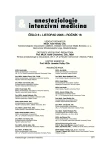-
Medical journals
- Career
Administration of recombinant activated factor VII (rFVIIa) in non-haemophiliac patients in the Czech Republic – analysis of selected data from the UniSeven register
Authors: V. Černý * 1; J. Blatný 2; L. Dušek 3; P. Brabec 3
Authors‘ workplace: Klinika anesteziologie, resuscitace a intenzivní medicíny, Univerzita Karlova v Praze, Lékařská fakulta v Hradci Králové, Fakultní nemocnice Hradec Králové 1; Oddělení klinické hematologie, Centrum pro trombózu a hemostázu, Fakultní nemocnice Brno 2; Centrum biostatistiky a analýz, Lékařská a Přírodovědecká fakulta Masarykovy univerzity v Brně 3
Published in: Anest. intenziv. Med., 16, 2005, č. 6, s. 296-304
Category: Intensive Care Medicine - Original Paper
Overview
Objective:
Analysis of data on administration of the recombinant activated factor VII (rFVIIa) in non-haemophiliac patients in the Czech Republic.Design:
Analysis of prospective data from a computer databasis.Materials and Methods:
The UniSeven register data from 2001 till 31/05/2005.Results:
During the studied period, 197 cases of administration of rFVIIa were entered in the database, of which 180 were cases of administration of rFVIIa in life-threatening haemorrhage (LTH) and in 17 cases rFVIIa was administered as prophylaxis/prevention of LTH. The most frequent reasons for administering rFVIIa was LTH, due to trauma or a surgical procedure unrelated to trauma. The survival rate of the recorded episodes of LTH due to trauma treated with rFVIIa was 66.5 %, the mean dose was 98 mcg/kg and median dose 100 mcg/kg. The second largest group were patients treated with rFVIIa for LTH during surgical procedure unrelated to trauma, whose survival rate was 55 %, mean dose 94 mcg/kg and median dose 100 mcg/kg. The consumption of blood and transfusion products was significantly reduced after the administration of rFVIIa compared with the consumption prior to it. The rFVIIa was used for prevention of LTH in 17 cases, mean dose 37 mcg/kg, median dose 13 mcg/kg. There were no deaths or thrombo-embolic complications related to the administration of rFVIIa.Conclusion:
Analysis of the data from the UniSeven register supports high effectiveness and safety of administration of rFVIIa in many clinical situations. The administration of rFVIIa in patients whose episodes of LTH were recorded in the Register resulted in a significant reduction of the amount of transfused units of red cells, plasma, colloids and vasopressor therapy.Key words:
recombinant activated factor VII – haemorrhage
Labels
Anaesthesiology, Resuscitation and Inten Intensive Care Medicine
Article was published inAnaesthesiology and Intensive Care Medicine

2005 Issue 6-
All articles in this issue
- A comparison of the effectiveness of continuous positive airway pressure and high-frequency jet ventilation applied by naso-oral mask in patients treated for pulmonary oedema
- Predictive factors of failure of non-invasive positive pressure ventilation in patients with acute respiratory failure due to exacerbation of chronic obstructive airway disease
- Administration of recombinant activated factor VII (rFVIIa) in non-haemophiliac patients in the Czech Republic – analysis of selected data from the UniSeven register
- The role of linezolide in the treatment of resistant gram-positive infections
- Anaesthesiology and Intensive Care Medicine
- Journal archive
- Current issue
- Online only
- About the journal
Most read in this issue- The role of linezolide in the treatment of resistant gram-positive infections
- A comparison of the effectiveness of continuous positive airway pressure and high-frequency jet ventilation applied by naso-oral mask in patients treated for pulmonary oedema
- Predictive factors of failure of non-invasive positive pressure ventilation in patients with acute respiratory failure due to exacerbation of chronic obstructive airway disease
- Administration of recombinant activated factor VII (rFVIIa) in non-haemophiliac patients in the Czech Republic – analysis of selected data from the UniSeven register
Login#ADS_BOTTOM_SCRIPTS#Forgotten passwordEnter the email address that you registered with. We will send you instructions on how to set a new password.
- Career

